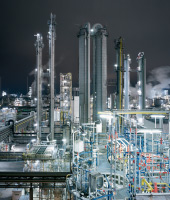Growing through Our Own Resources
The stage is set for growth in the European polymer business. Products tailored to the local construction industry have generated exceptionally high growth in sales volumes for dispersible polymer powders in Russia, Eastern Europe and Turkey. WACKER is opening up lucrative markets in Western Europe as well, thanks to innovations and the use of polymers in new applications.
Circular towers and windowless, rectangular facades – from the outside, the building looks like a modern-day fortress. Stored on the ground floor of the warehouse are pallets, stacked with 25-kilogram bags and 1,000-kg big bags. And running in the background 24 hours a day, 365 days a year are the spray dryers, which take a milky-white dispersion and turn it into fine dust – VINNAPAS® dispersible polymer powder.
The new spray dryer that just recently started up at Burghausen has an annual capacity of 50,000 metric tons of powder, making it the largest, most modern and efficient system of its kind anywhere in the world. WACKER installed this spray dryer to meet Europe’s growing demand for dispersible polymer powders – as WACKER’s sales of dispersible polymer powders rose 10 percent over the previous year. Thanks to VINNAPAS®, WACKER has been the undisputed world leader in this field for years, and currently enjoys a share of over 50 percent on the European market.
VINNAPAS® – a household all-rounder
WACKER’s polymeric binders are used in a variety of applications – especially in modifying cementitious systems. The basic principle is always the same: as the mortar hardens, elastic polymer bridges form between the brittle mineral components. Among other advantageous properties, these enhance flexibility and bonding. Here are a few examples:

Plasters
Polymeric binders enhance adhesion to the substrate, as well as improving the abrasion resistance and workability of mineral plasters.
Grout Mortars
VINNAPAS®-modified grout mortars are water-repellent and reduce water absorption.
ETICS/EIFS
VINNAPAS® binders deliver excellent adhesion of external thermal insulation composite systems to all substrates and their flexibility enables them to compensate for the different expansion coefficients of various materials.
Facades
VINNAPAS® dispersions can be formulated for exterior paints with high dirt pick-up resistance and constant properties.
Self-Leveling Flooring Compounds
The leveling properties of dispersible polymer powders mean that smooth surfaces can be achieved in just one step.
Tile Adhesives
VINNAPAS® improves the flexibility of cementitious tile adhesives, is water repellent and prevents stress cracking between the wall and tile.
Sealing Slurries
Polymer-modified mineral sealing slurries are usually used for waterproofing damp and wet locations.
Smoothing Mortar
Dispersible polymer powders improve the plasticity of cementitious systems and thus enhance the adhesive bond to the substrate.
Energy Saving Is Booming in Europe
The many bags in the warehouse give only a vague picture of how large this business really is. In the emerging markets of Eastern Europe, urbanization and the standard of living are on the rise, which drives up sales volumes of VINNAPAS®. Self-leveling flooring compounds, renders, powerful tile adhesives and energy-saving external thermal insulation composite systems (EIFS/ETICS) show huge potential.
Energy conservation is an especially important factor driving the growth of these polymeric powders in Western Europe. In Germany alone, the federal government has set aside several billion euros over the next five years for renovating buildings through its Climate Action Program. A major portion of these state-sponsored investments are earmarked for thermal insulation in building facades. In these applications, polymeric binders are indispensable components of the mortar used for bonding individual layers together and for holding the insulation panels permanently in place over a building’s exterior.
Saving energy is a booming business for Germany’s neighbors as well. An additional test facility where manufacturers can assess new facade systems was recently opened at WACKER’s Burghausen site. External thermal insulation composite systems are put to the test in this facility’s two environmental chambers, which simulate an extremely wide variety of weather conditions, from rain to permafrost. Being able to subject materials to environmental extremes at this accelerated pace allows WACKER customers to launch their insulation systems on the market more quickly. A second test facility in Moscow provides assistance to Russian manufacturers.
High-Quality Construction Chemicals Are in Demand
The Moscow technical competence center team helps construction industry customers address any other issues they may have surrounding mortar and related materials. WACKER was an early player in local efforts to develop innovations for Russia. Chemists in Moscow, for instance, are currently working with customers on adhesive formulations that can be processed at temperatures below freezing, so that thermal insulation installers do not have to interrupt their work between October and April.
Demand for high-quality, emission-free construction chemicals is rising in the countries of the CIS region, which is a positive development for WACKER. “That makes our products stand out,” says Ole Mecker of Construction Polymers, where he is responsible for Eastern Europe, the Middle East and Africa. One example of this is the current popularity of large tiles in Poland, western Russia and southeastern Europe – tilers need modified adhesives in order to lay these heavy tiles, which are made of porcelain stoneware, porcelain or natural stone.
In Russia, WACKER is also becoming increasingly involved in specialty areas, as sales manager Sergei Bezruchko explains: “At our technical competence center in Moscow, we’re currently noticing considerable interest in self-leveling flooring compounds for uses such as industrial flooring.” In Poland and Turkey, on the other hand, ETICS adhesives are the big sellers. As a result, Mecker is very satisfied with dispersible polymer powder sales in Eastern Europe, Russia and the other CIS states. “The region’s 2014 sales were 16 percent higher than the year before,” the regional manager points out. “And we saw significant growth in absolute terms, too.” The plans for the future are no less ambitious: Mecker and his team hope to see their region’s sales volume increase by 50 percent by 2018.
Increasing prosperity is not the only factor entering into the team’s calculations – in countries like Russia, Poland and Turkey, Mecker and his colleagues are hoping that new dispersible polymer powders will make inroads in additional market segments where high-quality VINNAPAS® has not been attractive thus far. Last year, at MosBuild, an annual construction exposition in Moscow, Sergei Bezruchko showed his customers a binder for self-leveling flooring compounds that had been developed for the Russian market. Besides being efficient and environmentally safe, the binder is also ideal for cost-conscious customers. “With products like these, we’re specifically targeting customers whose business is not within our core segment,” explains Bezruchko, who has spent the past 15 years on the road for WACKER between St. Petersburg and Siberia.
Growth in the East
WACKER’s business with the Eastern European construction industry experienced growth from 2010 to 2014. Growth was strongest in:

Average annual growth, 2010 to 2014 in %
As sales manager, he has a unique understanding of the construction market in Russia and the CIS states. “We have binders that are tailored to regional markets, which helps us compete well with domestic competitors,” he observes. “Even though the ruble is weak.” Bezruchko does not, incidentally, see the crisis in Ukraine as posing a threat to the polymer business. “Our products are primarily used for building renovations, which protects us from booms and bubbles – and, for the most part, fortunately shields us from crises too,” he explains. The Russian ban on imports of specific goods from the European Union likewise has had no direct impact on business, Mecker adds.
New Construction Products
Production at Burghausen continues around the clock, as developers there are likewise working full speed on new construction products. These include new reactive polymers for use in construction applications, where they could replace liquid epoxy resins. This is one example of how polymers can make headway into completely new applications as substitutes for the technologies traditionally used there. “The advantages of these polymers are enormous,” says Dr. Rainer Fischer, a sales manager responsible for Central and Eastern Europe as well as Turkey. He notes that the powders are easier to process than two-component liquid epoxy resins, and that they are more flexible and offer better adhesion. They are also non-allergenic, and are not subject to the corresponding labeling requirements, says Fischer. The biochemist can conceive of quite a few applications: “Examples of applications for reactive polymers could include floor coverings, highly resilient grout mortars, and coatings for concrete and roofs,” he observes. “This huge market has been dominated by epoxy resins up to now.”
High-Tech Concrete with Potential
Polymeric binders could also have a new role to play in concrete. Experts in Burghausen are currently testing countless tunnel, railroad and freeway construction applications, such as pervious concrete, which absorbs sound and allows water to seep through, since it does not seal the surface. Deutsche Bahn, Germany’s national rail company, has already used pervious concrete to renovate one set of tunnel tracks near Kassel – the project was so successful that work is now underway to renovate the other set.
Germany’s Federal Highway Research Institute intends to test concrete modified with polymeric binders in the near future. The concrete, which will be used as surfacing for a test section of roadway, is expected to prevent hydroplaning and make traffic significantly quieter. “It always takes a few years for new materials to be approved for freeway construction,” Mecker explains. “But once the market has embraced this solution, we foresee quite a lot of potential in Europe and beyond.”












